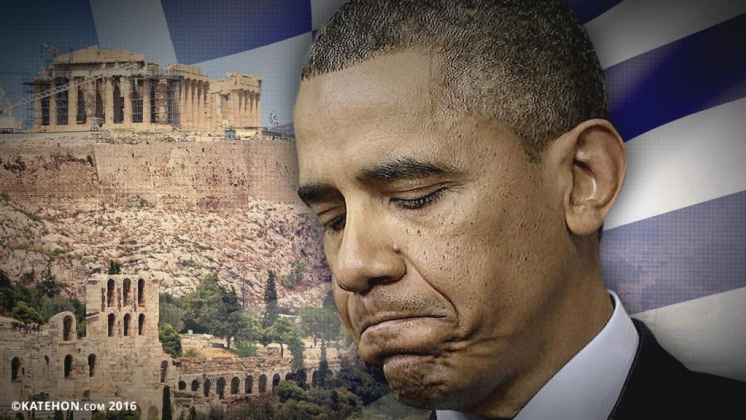Obama in Athens and the question of Cyprus
One of the reasons, many observers believe, President Obama went to Greece this week, is to press Athens to be “helpful” for a “solution” to the Cyprus problem. On the other hand the European Commission is also pressing hard on both Nicosia and Athens to accept a solution, even worse than the one the Cypriot people had rejected back in 2004, by voting 'NO' by an overwhelming majority in a referendum held in both the territories controlled by the Republic of Cyprus and those under the control of the Turkish Army, which invaded Cyprus in 1974 and does not seem willing to leave the island, with or without an agreed solution.
It seems the United States of America and the European Union are so satisfied with their achievements in the Middle East and Ukraine, they want now to apply their tested diplomatic and other skills in Cyprus. But Cyprus is a member of the European Union and what will happen there will gravely affect all of Europe and its policies towards Greece, Turkey, and the Middle East. In the worst possible scenario, a bad solution in Cyprus has the potential of provoking a Bosnian-type conflict inside, not outside the EU. And it will make the Union hostage of the good will of Ankara.
This danger comes from the nature of the plan negotiated now in Cyprus and Switzerland, which is worse than the Annan plan, rejected back in 2004 by voters. But even before such a solution comes into effect, some observers do not exclude some sort of military or economic crisis, designed to provoke a shock to the people of the island, in order to push the frightened people to vote 'Yes' finally to a plan they don't now seem to like.
Anybody analyzing the strategic landscape of the Eastern Mediterranean and especially of the Greece-Cyprus-Turkey triangle, should be advised to remember that the scenarios of all wars and crises between Greeks and Turks during the 20th century, without exception, were not drafted in Athens, Ankara or Nicosia, but in Washington and other capitals. But they found, there, willing executioners. We can easily discern a “hidden” geopolitical agenda behind the imposition by the USA and NATO of a dictatorship in Greece in 1967 (necessary in order to provoke the Cyprus crisis of 1974), but also behind the imposition of an extremely tough “bail-out” program to Greece (2010), which has already destroyed the economic foundations of the Greek nation-state. The same is true of the “bail-in experiment” in Cyprus (2013) which led to the foreign control of its banks and to the sharp diminishing of Russian economic presence.
The fundamental problem with the Annan plan is not so much that it is discriminating massively against the Greek majority (82%), thus installing an unjust regime which, instead of leading to reconciliation, it would lead to the permanence of conflict between Greek and Turkish Cypriots.
In fact this plan could easily have been written by Ionesco. If it is finally accepted, it will create a strange entity similar to no other state in the world (except probably to Bosnia or East Timor). The plan provides for the creation (in a relatively small island) of various chambers, parliaments and senates, with a system of continuous vetos, which will guarantee jobs for thousands of lawyers and the impossibility of this new “state” to work. The architects of the plan know it, this is why they gave the final right of decision to foreigners (or alternatively, they discuss now a system tantamount to taking decisions by lotto). The new state will not have an army of its own, but a kind of international police to discipline the locals. This project represents a major infringement of all major provisions of the UN Charter, European, international and constitutional law.
This legal monster has still its own logic and this logic is pretending to solve the conlfict between majority and minority in Cyprus to trasform a once independent, sovereign and democratic state into a sort of post-modern protectorate (or, alternatively, with its crisis potential, to a weapon which could be used inside the EU to hold permanently Greece itself and the foreign relations of the EU hostages of the forces which will have the objective capacity to provoke an internal crisis in Cyprus).
Behind the Greek-Turkish conflict is hidden a geopolitical agenda for control of the Eastern Mediterranean. As we probably approach another crisis there, we strongly suggest to readers not familiar with Greek and Turkish sources, the following article by a leading figure of Western Marxism and the New Left, Professor of History and Sociology in UCLA and former editor of the New Left Review. It was published in 2008 in the London Review of Books and it contains all the most fundamental elements to understand the Cyprus conflict (the only “omission” if we should say so, being the non reference to the role of Israel in the conflict).


